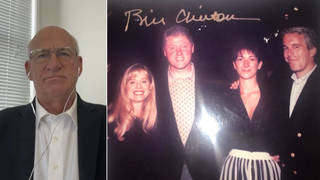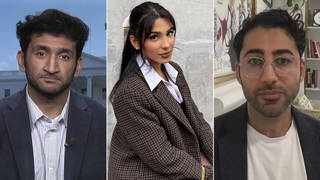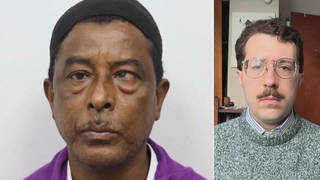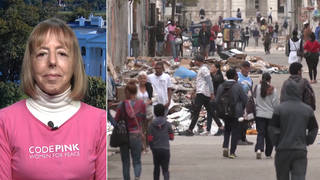
Guests
- Matt Dussexecutive vice president at the Center for International Policy and former foreign policy adviser to Senator Bernie Sanders.
Ukraine’s Air Force says Russia launched its largest aerial attack overnight since its 2022 full-scale invasion, firing a record 741 drones and missiles, most of them targeting the city of Lutsk in western Ukraine. The barrage prompted Poland to activate its air defenses and scramble fighter jets. Russia’s attack came after President Trump on Tuesday sharply criticized Vladimir Putin in his latest in a series of U-turns on Ukraine policy. We speak with Matt Duss, executive vice president at the Center for International Policy and former foreign policy adviser to Senator Bernie Sanders, on the latest developments. Trump is “learning that it’s actually not that easy,” he says. “And it’s not that easy because Vladimir Putin is not interested in a peace deal.”
Transcript
AMY GOODMAN: Matt Duss, before we go, I want to ask you about developments with Ukraine. Ukraine’s Air Force says Russia launched its largest aerial attack overnight since its invasion in 2022, firing a record 741 drones and missiles, most of them targeting the city of Lutsk in western Ukraine. The barrage prompted Poland to activate its air defenses and scramble fighter jets. Russia’s attack came after President Trump Tuesday sharply criticized Russian President Vladimir Putin, his latest in a series of U-turns on Ukraine policy.
PRESIDENT DONALD TRUMP: We get a lot of bull [bleep] thrown at us by Putin, if you want to know the truth. He’s very nice all the time, but it turns out to be meaningless.
AMY GOODMAN: Trump said the U.S. would now send additional weapons to Ukraine, after the Pentagon last week halted arms shipments. It’s being reported Defense Secretary Pete Hegseth did not inform the White House before he authorized the pause on weapon shipments to Ukraine Apparently, he said he wanted to check if there were enough weapons for the U.S. to have, as well as sending to Ukraine.
All of this comes as the first international court has found Moscow responsible for human rights abuses in Ukraine. Judges at the European Court of Human Rights in Strasbourg delivered two rulings against Russia today. In the first ruling, it found Russia violated international law during the conflict in Ukraine. It also ruled Russia was being — behind the downing of Malaysia Airlines Flight 17 in 2014, which killed 298 people.
Matt Duss, you’re former foreign policy adviser to Senator Bernie Sanders. You’re vice president of the Center for International Policy. Explain what’s going on here right now and the significance of Trump’s turnaround when it comes to Putin.
MATT DUSS: Right. I mean, I think we all heard that Trump was apparently unaware of the cutoff in arms from the U.S. to Ukraine that was announced last week. I mean, I think no one is surprised to learn once again that there is a pretty chaotic and disorganized policy process in this administration, if one can even call it a policy process.
But I think what’s important here is that Trump, having promised to — promised to make peace between Ukraine and Russia, saying that, you know, “I’ll make a peace deal in the first few days. It’ll be really easy,” he’s learning that it’s actually not that easy. And it’s not that easy because Vladimir Putin is not interested in a peace deal. I think that is the most important takeaway here.
Many of us support negotiations. I think no one wants peace more than the Ukrainians themselves. But we do need to understand that Putin has a vote, and Putin’s interests, as far as I’ve seen, have not changed. He’s going to continue to make war on Ukraine. He wants to — he wants to remove Ukraine’s independence. He wants to make Ukraine essentially a part of Russia’s imperium, as he sees it. He has not changed those goals. And until he does, it’s hard to see what we can actually negotiate in terms of a ceasefire, let alone a durable peace deal.
AMY GOODMAN: And why Trump’s turnaround?
MATT DUSS: I think Trump is — again, he feels embarrassed, I would guess, as someone who came in making bold claims about his ability to make a deal, saying, “Oh, I know Putin. I know how he thinks.” And here Putin has shown, “No, actually, you don’t understand how I think, or at least you have not recognized what I really want.” And that has really, you know, annoyed Donald Trump, clearly.
The question is what Donald Trump now does about it. Will he sustain this defensive aid to Ukraine? Will he work more closely with other allies in Europe to up the pressure? Will he work with others in the global community to put pressure on Putin to get to a real negotiation? But given the way he’s operated thus far, alienating allies, alienating others in the Global South who might serve a brokering role here, it’s hard for me to see how he could actually stand up a real and credible peace process.
AMY GOODMAN: In fact, going after, for example, the big BRICS summit in Brazil. BRICS, of course, stands for —
MATT DUSS: Right.
AMY GOODMAN: — stands for Russia, Brazil, India, China and South Africa.
MATT DUSS: Yeah.
AMY GOODMAN: Matt Duss, I want to thank you —
MATT DUSS: Yeah, that’s —
AMY GOODMAN: Go ahead. Twenty seconds.
MATT DUSS: No, I would just say, I mean, working through some of the BRICS countries, particularly Brazil, was an option here, and it’s one he should look at. But I don’t — given what he’s said and done thus far, I don’t know if that’s an option right now.
AMY GOODMAN: Matt Duss, executive vice president of Center for International Policy, former foreign policy adviser to Senator Bernie Sanders.
A major lawsuit is going to trial, just begun, challenging the Trump administration’s attack on free speech by arresting and detaining international students and professors who speak out on Palestinian rights. When we come back, we’ll go to Boston, where the trial is taking place.
[break]
AMY GOODMAN: “The Healers” by the late great Randy Weston. He performed the song when he spoke to Democracy Now! in 2012. Go to democracynow.org to see the whole interview.











Media Options